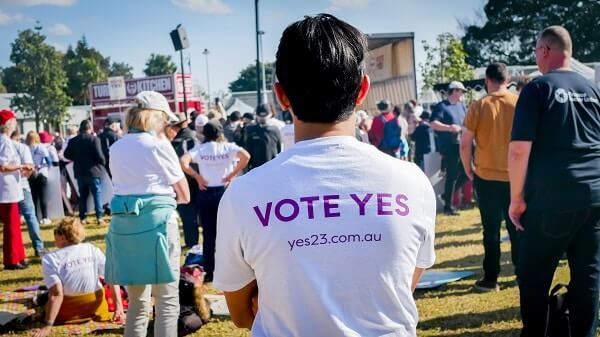Since establishing Desis for Yes a couple of months ago, we have been thrilled by the surge in community interest among Indian Australians in the upcoming First Nations Voice to Parliament referendum.
However, in the ongoing media and social media frenzy, it can be difficult to separate the facts from the misinformation, fearmongering, and conspiracy theories.
In moments such as these, one of the simplest ways to inform ourselves is to go back to the very words that will be inserted into the Australian Constitution if enough people vote ‘Yes’ for a constitutionally enshrined First Nations Voice at the upcoming referendum.
Chapter IX Recognition of Aboriginal and Torres Strait Islander Peoples
S129 Aboriginal and Torres Strait Islander Voice
In recognition of Aboriginal and Torres Strait Islander peoples as the First Peoples of Australia:
(i) There shall be a body, to be called the Aboriginal and Torres Strait Islander Voice;
(ii) The Aboriginal and Torres Strait Islander Voice may make representations to the Parliament and the Executive Government of the Commonwealth on matters relating to Aboriginal and Torres Strait Islander peoples;
(iii) The Parliament shall, subject to this Constitution, have power to make laws with respect to matters relating to the Aboriginal and Torres Strait Islander Voice, including its composition, functions, powers and procedures.
Let’s break it down. The first of three statements is about recognition. It is a fact that Aboriginal and Torres Strait Islanders are the First Peoples of Australia. More than 65,000 years of living here takes care of that.
As Australians, we have a duty to acknowledge and embrace this history of continuous civilisation. After all, regardless of when we arrived in this country or where we arrived from, we all live, work, study, pray, socialise, and raise families on Aboriginal and Torres Strait Islander land that was stolen during the last two hundred years of colonialism. By making our homes on Indigenous land, we have benefitted from that dispossession – this is where our duty comes from.
Our own cultures and languages also long predate that of the arrival of the East India Company in India. In this we share an affinity with Australia’s First Peoples.
The next statement is equally straightforward. It introduces the ‘body’ or ‘committee’ to be known as the Aboriginal and Torres Strait Islander Voice. What powers will this Voice actually have? Three words are critical here. The Voice “may make representations” to Parliament and to the Executive Government. This phrase essentially refers to the provision of advice. Nothing more, nothing less.
This advice will be strictly non-binding, and the Voice to Parliament will have no power to make laws, direct investments, or exercise any kind of veto over our elected representatives. It will be up to the Government whether they choose to implement that advice.
The Voice’s existence will enable the Government to take into account the lived experience and expertise of Aboriginal and Torres Strait Islander people when considering the issues that affect them. On life expectancy, health outcomes, the justice system, suicide prevention, early learning and education outcomes, respect and preservation of culture.
This should not be controversial to us as Indian Australians. Independence in 1947 enabled us to write our own constitution, craft our own laws, and design our own policies to address fundamental needs and rights. Aboriginal and Torres Strait Islander peoples have not had this privilege, and more than 120 years after Australia’s Constitution was written, what they are asking for is much more modest – simply to have a voice.
Will the Voice have power to raise taxes? No.
Will it have power to ‘take land’ or make you ‘pay rent’ or ‘reparations?’ No, and no.
In more ways than one, it would be a costly mistake for us to vote ‘no’ on the basis of such misinformation.
The final statement says the Parliament will decide what this new body, called the Voice, looks like – how many people are on it, how they’re elected or appointed, and what they can and can’t do.
And because the Parliament will decide that, whenever a new government wants to change how the Voice operates, how its members are selected and how long their terms will be, they will be able to change the laws underpinning the Voice in just the same way as they change the tax, superannuation laws, Medicare laws, employment, immigration laws and more.
In any case, the First Nations Referendum Working Group has articulated clear design principles that will underpin the Voice, should it come into effect. These principles emphasise the committee’s independence, its need to be representative and inclusive, its need to be transparent, and the fact that it will not have power to deliver programs or veto laws, policies, or investments.
The only thing governments will not be able to do is abolish the Voice entirely, like they have in the past with bodies such as the Aboriginal and Torres Strait Islander Commission (ATSIC). A constitutionally enshrined Voice offers a guarantee that the perspectives of Aboriginal and Torres Strait islander peoples will always be put forward to elected decision-makers. In this way, constitutional recognition is not just symbolic.
As the many dialogues and extensive consultations that led to the Uluru Statement from the Heart show (not to mention the polls), this proposal is what the overwhelming majority of Indigenous Australians are calling for. Here and now.
As Australians who collectively understand the impact of colonialism on a society, voting in this referendum is a unique opportunity to help Australia come to terms with its past and chart the path towards full reconciliation in the future. Let’s take this opportunity with open arms and be on the right side of history.
Nishadh Rego and Khushaal Vyas are Co-Founders of Desis for Yes, a collective of South Asian Australians deepening understanding and engagement on the referendum and the Uluru Statement from the Heart in diaspora communities.
Read More: Voice to Parliament: Is it a YES from you?






